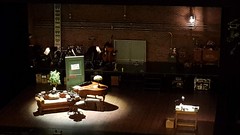Last weekend J and I saw the musical Fun Home at the Boston Opera House. Ever since Fun Home debuted on Broadway in 2015, I’ve been quietly skeptical that Alison Bechdel’s graphic memoir could be adapted for the stage, even after the show won multiple Tony awards and A (not her real initial) had seen and raved about it. Despite these glowing reviews, I wasn’t completely convinced a playwright could translate Bechdel’s book, which is masterfully told and powerfully illustrated, into another genre. I so closely associated the content of Bechdel’s memoir with its visual format featuring cartoon drawings of her childhood memories, journals, and family photos juxtaposed with her middle-aged commentary, I couldn’t imagine telling that complex and complicated story any other way.
Clearly I wasn’t imaginative enough. From its opening scene, Fun Home drew me and other audience members into Alison Bechdel’s unique family history. The daughter of a small town funeral director, Bechdel came out as a lesbian in college, discovered soon after that her father was secretly gay, and then lost him to an apparent suicide. On stage, this story is told with three different actresses playing Bechdel: young Alison, college Alison, and grown-up Alison, who observes from the margins, sketchbook in hand, as her life literally plays out before her (and the audience’s) eyes.
As a musical, Fun Home doesn’t try to replicate the visual format of the book. A small desk represents adult Alison’s cartoonist studio, the place where she struggles to understand and portray her conflicted relationship with her father, and individual props stand in for significant scenes in her life: the couch and piano in her meticulously restored, museum-like childhood home; a coffin in the funeral home (dubbed the “Fun Home” by Alison and her young brothers) that is the family business; and the door to the Gay Union where she came out as a lesbian in college. Audiences have to imagine the rest of the story.
The hand-drawn map of her father’s life that Bechdel provides in the book, for example–his birthplace, home, and site of death all contained within a tiny circle of rural Pennsylvania–is described in song but never shown. Instead, we imagine the vista of Bechdel’s childhood from her own imagined perspective as she plays airplane with her father and imagines a bird’s-eye view of her life.
Audience members also have to imagine a nameless character who plays a brief but pivotal role in Bechdel’s childhood: a butch truck driver who walks into a diner where young Alison is eating with her father. In the book, we see Bechdel’s drawing of a woman who never knew the impact she had on a girl who bridled against the dresses and barrettes her father forced her to wear. In the musical, young Alison stares at an off-stage, invisible figure who is invoked only through a recitation of her emblematic appearance: short hair, dungarees, lace-up boots, and a large ring of keys. The outfit and its impression are magical to young Alison: her first realization that people like her exist in the world outside her small circle.
Fun Home the book bills itself as “a family tragicomic,” and I have no shame in admitting I wept as the show turned toward its conclusion. Yes, there are moments of comedy in the story, such as the over-the-top, 70s-psychedelic dance number young Alison and her brothers create to advertise the family funeral home or the awkward bumbling of college Alison’s first sexual encounter. But college Alison’s earnest interactions with her father are heartbreakingly powerful without even a hint of sentimentality. Desperate to understand and be understood by her father, both college and adult Alison encounter instead silence, her questions cut off as abruptly as the oncoming truck that took her father’s life.
Whereas I approached Fun Home the musical with high expectations based on multiple readings of Alison Bechdel’s book, J intentionally did no research into the musical beforehand, knowing nothing more than my brief explanation that the show was based on a memoir by a lesbian cartoonist. His reaction to the show was the highest form of praise, as he said he was immediately drawn into Alison’s life not because it was a “gay story” but because it was an engaging and relatable story about an ordinary person who happens to be gay. Although the exact details of Alison Bechdel’s family upbringing are unique, her story is easy to relate to if you’ve ever had a family member (or a childhood) you’ve struggled to understand.






Nov 6, 2017 at 3:46 am
good review !
LikeLiked by 1 person
Nov 6, 2017 at 10:31 am
I recently read Fun Home (still have to post about it) and I am amazed that a musical was made out of it. Clearly, I lack imagination too!!
LikeLiked by 1 person
Nov 6, 2017 at 10:47 am
It’s an amazing show. If you have the chance to see it, I highly recommend it.
LikeLiked by 1 person